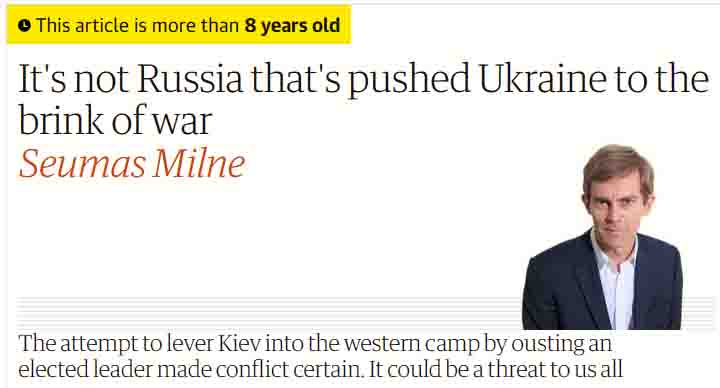I’m convinced that many of my friends and peers believe – though the more media savvy know better than to come right out and say so, even to themselves – that the Guardian and Observer are a cut above the rest in being truthful with us. To which I say:
- The trust built up by the Guardian, on issues which are important but not critical to power, enables it to deceive us massively on matters which are.
- For the most part its deceptions on the latter are lies of omission. (This, together with its advertising and sponsorship business model, is why recklessly mendacious narratives – like Saddam’s WMDs, and Russia as unprovoked aggressor in Ukraine – do not require consciously dishonest reporters and editors.)
- It is not enough – not nearly enough – to know these things at a cerebral level. I often say Western liberal intellectuals mistake cynicism for scepticism. The first is easy, the second hard work because it requires our internal as much as external vigilance; our actively doing combat with a barely conscious tendency to see liberal outlets as more trustworthy – even on matters vital to power – than other media.
The Guardian, April 30, 2014.

Granted, Seamus Milne, who would become Labour’s Director of Strategy and Communications under Jeremy Corbyn, is to the left of any current Guardian writer. But as Caitlin Johnstone says in a post yesterday, reminding us of his 2014 piece:
Milne was not some fringe voice who happened to get picked up for one Guardian op-ed by a strange editorial fluke; he published hundreds of articles with The Guardian over the course of many years, and kept on publishing for a year and a half after this Ukraine piece came out, right up until he went to work for Corbyn. He was on the left end of the mainstream media, but he was very much part of the mainstream media.
This article would of course have drawn controversy and criticism at the time; there were many people who were on the opposite side of the debate in 2014, though they would’ve had a fraction of the numbers of the shrieking conformity enforcers we see on all matters related to Ukraine today. Milne himself says that “the bulk of the western media abandoned any hint of even-handed coverage” after the Crimea annexation, so his article would have been an outlier to be sure. But the fact remains that it was published in The Guardian, and that it would never be published there today. 1
What was I just saying?
The trust built up by the Guardian, on issues which are important but not critical to power, enables it to deceive us massively on matters which are.
At the time of Mr Milne’s piece, April 30, 2014 – two months after the US orchestrated Maidan Square coup toppled Viktor Yanukovitch – Ukraine was important but not critical to power.
Now it is. Hence the wall of silence at Guardian Media Group.
* * *

Part of that trust might be because the Guardian (and the BBC) represent some sort of aspirational social group which might be called the ‘liberal inteligencia’ whose continued existence some believe in. They will, of course, perform due diligence and report honestly on any matter.
To those who trust the Guardian I have only two words to say: “George Monbiot”.